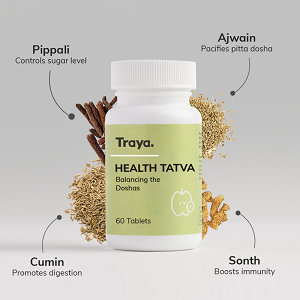In the realm of traditional Indian medicine, health is viewed not merely as the absence of disease but as a state of complete physical, mental, and spiritual well-being. Central to this holistic approach is the concept of "Health Tatva Traya," a triad of principles that guide individuals toward achieving and maintaining optimal health. These principles are rooted in Ayurveda, an ancient system of medicine that emphasizes balance and harmony within the body and with the surrounding environment.
The Three Pillars of Health
Health Tatva Traya consists of three foundational elements:
1. Ahara (Diet)
2. Vihara (Lifestyle)
3. Aushadha (Medicine)
Each pillar plays a crucial role in sustaining health and preventing disease.
Ahara: The Importance of Diet
Ahara, or diet, is considered the primary pillar of health. In Ayurveda, food is viewed as more than just sustenance; it is a source of energy, vitality, and healing. The right diet is tailored to an individual's constitution, or dosha (Vata, Pitta, Kapha), and is designed to balance the body's energies. A balanced diet promotes digestion, enhances immunity, and supports overall well-being.
Key principles of Ahara include:
- Eating fresh, seasonal, and locally sourced foods: These are believed to be in harmony with the body's natural rhythms.
- Incorporating all six tastes (sweet, sour, salty, bitter, pungent, and astringent): Ensuring a balanced diet.
- Mindful eating: Paying attention to hunger cues and eating in a calm environment.
Vihara: The Role of Lifestyle
Vihara encompasses daily routines, physical activity, mental health practices, and sleep. It is the second pillar of Health Tatva Traya, emphasizing the importance of a balanced lifestyle to maintain health and prevent disease. Ayurveda advocates for a lifestyle that is in harmony with nature, including:
- Dinacharya (Daily Routine): Establishing a consistent daily routine that includes waking up early, practicing personal hygiene, and engaging in regular physical activity such as yoga.
- Ritucharya (Seasonal Routine): Adjusting lifestyle practices to align with seasonal changes, ensuring the body adapts smoothly to different environmental conditions.
- Stress Management: Incorporating practices like meditation, pranayama (breathing exercises), and relaxation techniques to manage stress and promote mental well-being.
Aushadha: The Power of Medicine
Aushadha, or medicine, is the third pillar and involves the use of natural remedies to treat and prevent illness. Ayurvedic medicine utilizes a wide range of herbs, minerals, and other natural substances tailored to an individual's specific needs. The focus is on restoring balance within the body and addressing the root cause of disease rather than merely alleviating symptoms.
Key aspects of Aushadha include:
- Personalized Treatment*: Formulations are customized based on the individual's dosha and specific health concerns.
- Holistic Approach: Combining internal and external therapies, such as herbal supplements and therapeutic massages.
- Preventive Care: Emphasizing the use of tonics and rejuvenative therapies to enhance the body's natural defenses.
Integrating Health Tatva Traya in Modern Life
Incorporating Health Tatva Traya into modern life requires a commitment to mindful living and a willingness to adapt ancient wisdom to contemporary contexts. Here are practical steps to integrate these principles:
- Diet: Prioritize whole foods, reduce processed food intake, and experiment with Ayurvedic recipes that suit your dosha.
- Lifestyle: Establish a consistent routine, include regular exercise, and practice mindfulness and stress-reduction techniques.
- Medicine: Consult with an Ayurvedic practitioner to explore natural remedies and preventive care tailored to your individual needs.
By embracing the principles of Ahara, Vihara, and Aushadha, individuals can cultivate a balanced, healthy lifestyle that promotes longevity and enhances quality of life. Health Tatva Traya offers a comprehensive framework for understanding and achieving holistic health, blending time-honored traditions with modern wellness practices.









